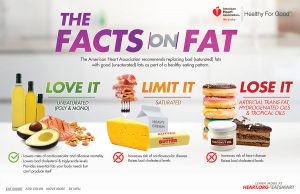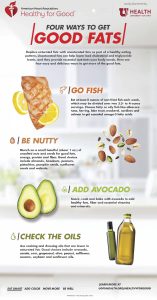Saturated fats are solid at room temperature and are primarily found in larger quantities in animal foods and some plant foods like coconut oil, palm, and palm kernel oil. Excess consumption can increase “bad” LDL cholesterol in your blood, one of the risk factors for developing atherosclerosis (hardening) of your arteries (American Heart Association, 2021).
Bellow are some general recommendations to decrease the content of saturated fats:
- If you consume meat, choose lean options such as lean or extra lean ground beef.
- Remember to trim visible fats from meat before cooking.
- Lean meat cuts include: For pork (tenderloin or loin chop); for lamb (cuts come from the leg, arm and loin)
- Prepare poultry and turkey without skin
- Prepare these meats without adding saturated or trans fat
- Cook with oil instead of butter
- Grill chicken breasts without the skin instead of frying it
- For dessert, have fruit salad, or fruit instead of ice cream
- Limit the consumption of processed meats such as bologna, sausage, hot dogs, and salami. They are high in both fat and sodium, and can increase your chances of developing colon cancer.
- Read labels and compare the amount of saturated fats in products.
What are trans fats?
There are two type of trans fats, the naturally occurring and artificial trans fats. Naturally occurring trans fats are produced in the animal’s gut, and small quantities of these fats are found in animal products. Artificial trans fats are formed by a process called hydrogenation, which means adding hydrogen to a liquid vegetable oil to convert it to a solid fat. Hydrogenation helps improving products shelf-life, texture and consistency, however, it does not help improve your heart health. Trans fats increase your “bad” LDL cholesterol and lower your “good” HDL “cholesterol”. Even when a product label says trans-fat free, it can still have up to 0.5 gram or less of trans fat per serving.
Recommendations to reduce trans fat intake:
- Read the nutritional labels. Look in the ingredients list for partially hydrogenated vegetable oils, and in the nutrition facts for (Zero gram trans fat).
- Fast foods and fried foods contains trans fats because they are fried in trans fats.
- Limit the consumption of baking goods such as crackers, muffins, pies, cakes, doughnuts, cookies.
- Choose soft margarine instead of the harder stick options.
Love unsaturated fats:
Unsaturated fats can protect your heart from heart disease, lower your cholesterol, and tryglycerides. Moreover, unsaturated fats provide essencial fats our body can’t produce. The American Heart Association created a helpful infographic (below) to teach people about different kinds of fats. Love the unsaturated good fats, limit saturated fats, and “lose” trans fats. Rich sources of unsaturated fats include, but are not limited to: nuts (walnuts, pecan, etc…), seeds (flexseeds, sesame, sunflower, pumpkim…), fish such as (salmon, tuna, trout), avocados, olives, peanut butter, tofu, soybeans, and plant oils (olive, canola, safflower, and sesame). Love your heart, love heart-healthy fats!
![]() Stay tuned for my next post on Understanding Food Labels!
Stay tuned for my next post on Understanding Food Labels!
References
American Heart Association. (2021). The Facts on Fats Infographic. Retrieved from: https://www.heart.org/en/healthy-living/healthy-eating/eat-smart/fats/the-facts-on-fats
Posted: June 6, 2022
Source: UF/IFAS Alert – https://blogs.ifas.ufl.edu/





